Share
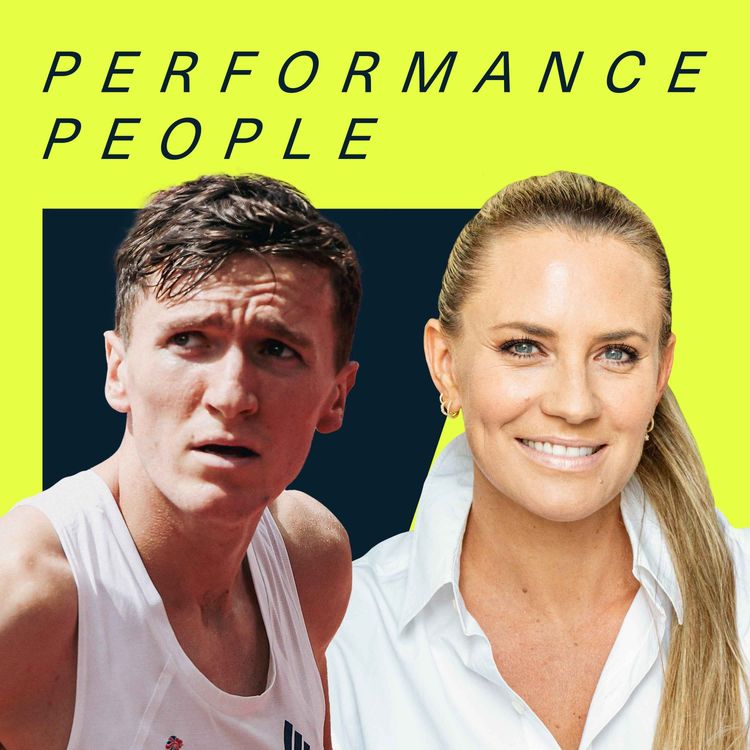
Performance People
The World Champion Runner That Doesn’t Like Running (But Loves Racing) | Jake Wightman | Paris 2024
As crazy as it sounds, middle-distance runner Jake Wightman doesn’t really enjoy the act of going for a run. Sounds like a bit of a problem when you’re an elite athlete with his sights set on an Olympic gold this summer. As a talented and sporty kid he was spotted for his potential and realised he needed to grab the opportunity - and the responsibility - that comes with it. Fortunately what he does love though is racing and the 2022 1500m World Champion offers a fascinating insight into what it’s like to be in the mix of a crowded final, where mind games, tactics and decision-making become the crucial difference between glory and despair. He also tells us what it’s like to have your Dad commentate on your big races, the importance of feeling his friends’ support and how the thrill of winning keeps him motivated as he prepares for the biggest summer of his life.
More episodes
View all episodes
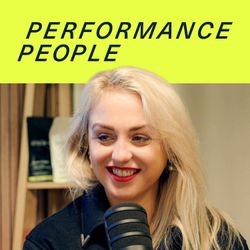
Aimee Fuller | Pressure, Injury and Walking Away from the Olympics
45:40|Former Winter Olympian turned broadcaster, Aimee Fuller joins Performance People to reflect on a career defined by courage, creativity and confronting fear.Aimee competed for Team GB at the Winter Olympics in Sochi 2014 and PyeongChang 2018, specialising in slopestyle and big air, and becoming the first woman to land a double backflip in competition. In this conversation, she opens up about the defining moment that shaped her journey; the extraordinary pressure of qualifying for her first Olympic Games, having to deliver career-best results in the final two events after sitting 72nd in the world rankings.She speaks candidly about injury, recovery and the psychological toll of elite sport, including how fear of injury began to outweigh performance ahead of her second Winter Olympics, a realisation that ultimately led to her retirement. Aimee also reflects on identity beyond competition, the challenge of letting go, and how running and broadcasting have helped her rediscover purpose and joy in performance.Insightful, honest and full of energy, this episode explores resilience, pressure and what it really takes to step away from the thing that once defined you, and move forward stronger.________________________________The Performance People podcast, in partnership with J.P. Morgan Private Bank, talks to high-performers in the world of sport and beyond, to bring defining moments, hard-earned insights and expert advice to everyday performance. New episodes every Tuesday.ainslie + ainslie NIGHT POWDER, winner of Best Sleep Supplement in the GQ Sleep Awards 2025.We love performance, which is why we’ve launched ainslie + ainslie – the first supplement brand to be developed inside elite sport. Now available for everyone. Find out more at www.ainslieainslie.com________________________________Connect with Performance PeopleHit subscribe today for the latest. 🎧 Spotify/Apple Musichttp://www.performancepeoplepodcast.com/https://www.instagram.com/performance.people/________________________________The views and opinions expressed on Performance People are those of the guests and hosts, and do not necessarily represent the views of ainslie + ainslie, J.P. Morgan Private Bank, or any affiliated organisations.This podcast is produced by Gameface Limited and is intended for general information and entertainment purposes only.© Gameface Limited 2026. All rights reserved.________________________________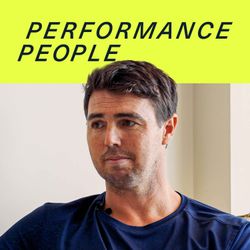
Iain ‘Goobs’ Jensen | Resilience, Recovery and Returning Home
33:33|Iain ‘Goobs’ Jensen reflects on elite performance, pressure and resilience in SailGP. This episode of Performance People, in partnership with J.P. Morgan Private Bank, was recorded in Abu Dhabi, just ahead of the SailGP Grand Final, at a moment of real intensity, both for the championship and for Goobs personally. From Olympic gold, via a 2025 Emirates GBR treble to a new chapter with Australian Flying Roos, this is a remarkable story of high-performance sailing.A double Olympic gold medallist and one of the most respected figures in high-performance sailing, Goobs reflects on a career that has spanned the Olympic pathway, the America’s Cup and SailGP, all during a period of extraordinary technological change in the sport. From foiling breakthroughs to life inside prototype racing machines, he offers rare insight into what it takes to perform when the margins are vanishingly small.The conversation also goes far beyond racing. Iain speaks with honesty about setbacks, pressure and perspective, including the health challenges that interrupted his career and reshaped his outlook on performance, ambition and team culture. Throughout, he returns to the importance of trust, shared purpose and doing the basics well under extreme pressure.The timing of this episode marks a significant transition. After years with Emirates GBR SailGP Team, Goobs discusses his decision to return home to Australia and join the Bonds Flying Roos, ahead of the start of the 2026 SailGP Championship in Perth.This is a thoughtful, deeply human conversation about resilience, elite performance and knowing when it’s time for the next chapter.________________________________The Performance People podcast, in partnership with J.P. Morgan Private Bank, talks to high-performers in the world of sport and beyond, to bring defining moments, hard-earned insights and expert advice to everyday performance. New episodes every Tuesday.________________________________ainslie + ainslie NIGHT POWDER, winner of Best Sleep Supplement in the GQ Sleep Awards 2025.We love performance, which is why we’ve launched ainslie + ainslie – the first supplement brand to be developed inside elite sport. Now available for everyone. Find out more at www.ainslieainslie.com________________________________Connect with Performance PeopleHit subscribe today for the latest.🎧 Spotify/Apple Musichttp://www.performancepeoplepodcast.com/https://www.instagram.com/performance.people/________________________________The views and opinions expressed on Performance People are those of the guests and hosts, and do not necessarily represent the views of ainslie + ainslie, J.P. Morgan Private Bank, or any affiliated organisations.This podcast is produced by Gameface Limited and is intended for general information and entertainment purposes only.© Gameface Limited 2026. All rights reserved.
Performance People 2025 Wrapped | Insights, Lessons & Funnies from Elite Sport
19:30|From defining moments to peak performance, recovery, leadership and everything in between, this special end-of-year episode brings together the very best of Performance People.Across the past year, we’ve sat down with world-class athletes, coaches and thinkers to understand what really drives performance, not just on the biggest stages, but in the moments that shape careers and lives. This highlights episode captures the essence of those conversations.You’ll hear candid reflections on defining moments from the likes of Mike Tindall, Ed Chamberlin, Matthew Syed, Jimmy Anderson, George North and Geraint Thomas. There are deep dives into peak performance and strategy with Ben Ainslie, Alistair Brownlee, James Vowles, Tammy Beaumont and Ben Ryan, alongside powerful insights into recovery, resilience and mindset from athletes including Katie Boulter, Sarah Storey, Fin Smith and Abi Burton.And because performance isn’t always serious, we’ve also included some of our favourite off-script moments, interruptions and giggles from guests such as Gabby Logan, Natalie Pinkham, Mike Tindall and Ted Kravitz.Whether you’re an athlete, leader or simply curious about what it takes to perform under pressure, this episode is a celebration of the conversations that defined our year.________________________________The Performance People podcast, in partnership with J.P. Morgan Private Bank, talks to high-performers in the world of sport and beyond, to bring defining moments, hard-earned insights and expert advice to everyday performance. New episodes every Tuesday.________________________________ainslie + ainslie NIGHT POWDER, winner of Best Sleep Supplement in the GQ Sleep Awards 2025.We love performance, which is why we’ve launched ainslie + ainslie – the first supplement brand to be developed inside elite sport. Now available for everyone. Find out more at www.ainslieainslie.com________________________________Connect with Performance PeopleHit subscribe today for the latest. 🎧 Spotify/Apple Musichttp://www.performancepeoplepodcast.com/https://www.instagram.com/performance.people/________________________________The views and opinions expressed on Performance People are those of the guests and hosts, and do not necessarily represent the views of ainslie + ainslie, J.P. Morgan Private Bank, or any affiliated organisations.This podcast is produced by Gameface Limited and is intended for general information and entertainment purposes only.© Gameface Limited 2025. All rights reserved.________________________________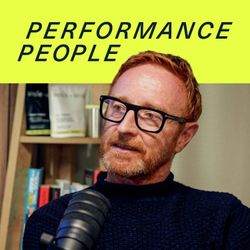
Ben Ryan | Inside Brentford FC’s Data-Centric Performance Approach
56:15|Ben Ryan is one of the most distinctive performance leaders in elite sport.Now Performance Director at Brentford Football Club, Ben is helping shape one of the Premier League’s most progressive, data-driven environments, where alignment, culture and marginal gains matter as much as talent.In this conversation with Georgie Ainslie, Ben explains how Brentford’s performance model works in practice: from decision-making rooted in data, to creating psychological safety in a ruthless industry, to managing player availability, recovery and long-term development in a congested football calendar. He shares how Brentford balance innovation with consistency, and why being “boringly sensible” can be a competitive advantage.Ben’s thinking, however, is forged well beyond football. He reflects on his extraordinary journey in rugby, including his time as head coach of Fiji Sevens, where he led the team to their first ever Olympic gold medal. That experience, built on cultural understanding, autonomy and belief, continues to shape his approach to leadership today.This is a wide-ranging discussion about performance under pressure, learning from failure, and building environments where people can do the best work of their careers, whatever the sport.This episode of Performance People is brought to you by J.P. Morgan Private Bank.________________________________The Performance People podcast, in partnership with J.P. Morgan Private Bank, talks to high-performers in the world of sport and beyond, to bring defining moments, hard-earned insights and expert advice to everyday performance. New episodes every Tuesday.________________________________ainslie + ainslie NIGHT POWDER, winner of Best Sleep Supplement in the GQ Sleep Awards 2025.We love performance, which is why we’ve launched ainslie + ainslie – the first supplement brand to be developed inside elite sport. Now available for everyone. Find out more at www.ainslieainslie.com________________________________Connect with Performance PeopleHit subscribe today for the latest.🎧 Spotify/Apple Musichttp://www.performancepeoplepodcast.com/https://www.instagram.com/performance.people/________________________________The views and opinions expressed on Performance People are those of the guests and hosts, and do not necessarily represent the views of ainslie + ainslie, J.P. Morgan Private Bank, or any affiliated organisations.This podcast is produced by Gameface Limited and is intended for general information and entertainment purposes only.© Gameface Limited 2025. All rights reserved.________________________________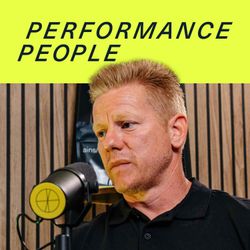
AI and the Future of Human Performance with Pete McKnight
27:33|In this episode, Georgie sits down again with human performance coach Pete McKnight, a man with nearly 25 years’ experience shaping Olympians, F1 drivers and world-class performers. Pete breaks down what “human performance” really is: a multi-dimensional blend of physiology, psychology, cognition and nutrition, and why the days of thinking fitness alone defines performance are long gone.He explains how the rise of specialist performance teams has transformed elite sport, moving from a lone strength coach to integrated units of physios, psychologists, nutritionists and data experts all pulling in the same direction. But the real magic, Pete says, isn’t in assembling the biggest team; it’s in getting them to collaborate, individualise and adapt around the athlete.Georgie and Pete dig into what the rest of us can learn from elite environments: clarity of goals, proper planning and, above all, relentless consistency. No shortcuts. No silver bullets. Just smart, sustained work.They also explore how technology and AI are reshaping training, from affordable diagnostics to data-driven programmes, and how the future hinges on understanding the athlete as much as the algorithm. Plus: fascinating insights from Pete’s work across Formula One, defence and space on how humans and machines can truly perform together.________________________________The Performance People podcast, in partnership with J.P. Morgan Private Bank, talks to high-performers in the world of sport and beyond, to bring defining moments, hard-earned insights and expert advice to everyday performance. New episodes every Tuesday.ainslie + ainslie NIGHT POWDER, winner of Best Sleep Supplement in the GQ Sleep Awards 2025.We love performance, which is why we’ve launched ainslie + ainslie – the first supplement brand to be developed inside elite sport. Now available for everyone. Find out more at www.ainslieainslie.com________________________________Connect with Performance PeopleHit subscribe today for the latest. 🎧 Spotify/Apple Musichttp://www.performancepeoplepodcast.com/https://www.instagram.com/performance.people/________________________________The views and opinions expressed on Performance People are those of the guests and hosts, and do not necessarily represent the views of ainslie + ainslie, J.P. Morgan Private Bank, or any affiliated organisations.This podcast is produced by Gameface Limited and is intended for general information and entertainment purposes only.© Gameface Limited 2025. All rights reserved.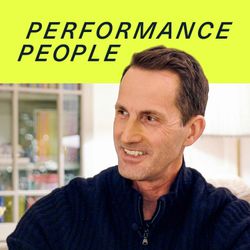
Ben Ainslie | The Future of the America’s Cup & A Treble for Emirates GBR
38:14|Fresh from a history-making weekend in Abu Dhabi, Ben Ainslie joins Georgie at home to reflect on Emirates GBR’s extraordinary treble; the season title, the Grand Final and the Impact League win and why this victory mattered more than most after a turbulent year for the team. Ben breaks down the decisive moments of the Grand Final race, highlighting Dylan Fletcher’s leadership and charting the journey that took him from being dropped earlier in SailGP to returning as a champion.The conversation then turns to the biggest shift in modern sailing: the new America’s Cup partnership agreement. Ben explains why the Cup had to evolve, the challenges of uniting rival teams, and how this unprecedented structure aims to secure the event’s long-term future. He lifts the lid on difficult negotiations, commercial pressures, and what this transformation means for athletes, teams, and fans.Finally, Georgie asks the question everyone wants answered: will Ben sail in the next America’s Cup? He reflects on legacy, leadership, and whether stepping back, or stepping on, is the right call. A candid, insightful episode offering a rare inside look at elite sport, big decisions, and the future of high-performance sailing.________________________________The Performance People podcast, in partnership with J.P. Morgan Private Bank, talks to high-performers in the world of sport and beyond, to bring defining moments, hard-earned insights and expert advice to everyday performance. New episodes every Tuesday.ainslie + ainslie NIGHT POWDER, winner of Best Sleep Supplement in the GQ Sleep Awards 2025.We love performance, which is why we’ve launched ainslie + ainslie – the first supplement brand to be developed inside elite sport. Now available for everyone. Find out more at www.ainslieainslie.com________________________________Connect with Performance PeopleHit subscribe today for the latest. 🎧 Spotify/Apple Musichttp://www.performancepeoplepodcast.com/https://www.instagram.com/performance.people/________________________________The views and opinions expressed on Performance People are those of the guests and hosts, and do not necessarily represent the views of ainslie + ainslie, J.P. Morgan Private Bank, or any affiliated organisations.This podcast is produced by Gameface Limited and is intended for general information and entertainment purposes only.© Gameface Limited 2025. All rights reserved.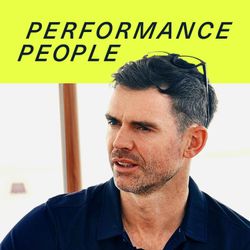
Sir Jimmy Anderson | Bazball, Ben Stokes’ Leadership and the Secret to Staying Elite at 43
25:06|Recorded in Abu Dhabi as Emirates GBR were crowned SailGP 2025 Champions, England’s fast bowling G.O.A.T. Jimmy Anderson joins Performance People, in partnership with J.P. Morgan Private Bank, for a wide-ranging conversation on cricket, leadership and longevity. Fresh from experiencing an F50 race boat up close, Jimmy reflects on England’s two-day defeat in the opening Ashes Test, a result that stunned both players and fans. He explains why the collapse felt so sudden, what positives England can still take from the match and why Ben Stokes and Brendon McCullum will stay true to ‘Bazball’ ahead of the 2nd test.Jimmy weighs in on the big tactical question: adapt or double down? He believes this England side is more likely to reinforce its attacking principles, but stresses the importance of reading conditions more intelligently rather than playing on autopilot.He offers rare insight into Ben Stokes’ captaincy, describing him as the best leader he has played under; tactically sharp, empathetic and able to get the best from every individual, and highlights the powerful partnership Stokes has formed with McCullum.Jimmy’s defining career moment takes us back to the 2010–11 Ashes, where England’s dominant win in Australia transformed his confidence and consistency. He also discusses the discipline behind his remarkable longevity and why, at 43, he still loves the game as much as ever.________________________________The Performance People podcast, in partnership with J.P. Morgan Private Bank, talks to high-performers in the world of sport and beyond, to bring defining moments, hard-earned insights and expert advice to everyday performance. New episodes every Tuesday.ainslie + ainslie NIGHT POWDER, winner of Best Sleep Supplement in the GQ Sleep Awards 2025.We love performance, which is why we’ve launched ainslie + ainslie – the first supplement brand to be developed inside elite sport. Now available for everyone. Find out more at www.ainslieainslie.com________________________________Connect with Performance PeopleHit subscribe today for the latest. 🎧 Spotify/Apple Musichttp://www.performancepeoplepodcast.com/https://www.instagram.com/performance.people/________________________________The views and opinions expressed on Performance People are those of the guests and hosts, and do not necessarily represent the views of ainslie + ainslie, J.P. Morgan Private Bank, or any affiliated organisations.This podcast is produced by Gameface Limited and is intended for general information and entertainment purposes only.© Gameface Limited 2025. All rights reserved.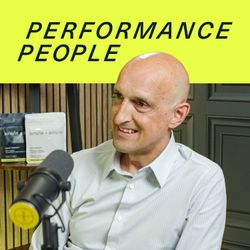
Matthew Syed | Beckham, McIlroy & the Mindset of Elite Performers
51:55|This week on Performance People, Georgie is joined by writer, broadcaster and former Olympian Matthew Syed; one of the most influential thinkers on high performance today. In a conversation that moves from table-tennis halls in suburban Reading to global sporting icons, Matthew unpacks the moments and mentors that shaped his life, and the ideas that continue to guide his work.He reflects on the remarkable influence of his childhood coach, Peter Charters, and how the culture of curiosity, individuality and care that Charters created became the foundation for Matthew’s career in sport, and beyond. Matthew also opens up about the pressure of the Sydney 2000 Olympic Games, describing in powerful detail the moment he “choked”, why it happened, and how it sparked a lifelong fascination with performance psychology.From David Beckham’s resilience and Rory McIlroy’s Masters triumph to the importance of losing with grace, the conversation explores why elite sport is a microcosm of character, humility and growth. Matthew shows how these lessons translate into everyday life, for parents, leaders, young people and anyone striving to improve.In classic Syed style, this is a masterclass in mindset: honest, generous and packed with ideas you’ll want to take straight into your own world.________________________________The Performance People podcast, in partnership with J.P. Morgan Private Bank, talks to high-performers in the world of sport and beyond, to bring defining moments, hard-earned insights and expert advice to everyday performance. New episodes every Tuesday.ainslie + ainslie NIGHT POWDER, winner of Best Sleep Supplement in the GQ Sleep Awards 2025.We love performance, which is why we’ve launched ainslie + ainslie – the first supplement brand to be developed inside elite sport. Now available for everyone. Find out more at www.ainslieainslie.com________________________________Connect with Performance PeopleHit subscribe today for the latest. 🎧 Spotify/Apple Musichttp://www.performancepeoplepodcast.com/https://www.instagram.com/performance.people/________________________________The opinions expressed in this episode are those of the guests and hosts and do not necessarily reflect the views of ainslie + ainslie, J.P. Morgan, or Gameface Limited.Performance People is for informational and entertainment purposes only and should not be regarded as professional advice.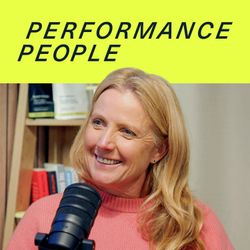
From Prince Harry’s Invictus Games to the Winter Olympics | Vicky Gosling OBE, CEO of GB Snowsport
41:34|On this episode of Performance People, in partnership with JP Morgan Private Bank, Georgie speaks with Vicky Gosling OBE, CEO of GB Snowsport, whose career has been shaped by one extraordinary defining moment.In 2013, Vicky was preparing to deploy to Afghanistan, leaving behind her young family for what she thought would be a demanding posting. Instead, a phone call redirected her life: she was being reassigned to lead on what would become the first-ever Invictus Games. Working alongside Prince Harry, Vicky helped build a global movement showcasing the power of adaptive sport and the resilience of wounded servicemen and women. That experience transformed her sense of purpose and has guided every leadership role since.Vicky reflects on how her 20-year military career instilled mission-first clarity, resilience and an unshakeable commitment to the people she serves. Those principles now underpin her work at GB Snowsport, where she and her team have transformed a relatively underfunded programme into one capable of producing world champions and genuine medal contenders heading into the Winter Olympics in Milano Cortina in February. From Mia Brookes and Zoe Atkin to Charlotte Bankes and Dave Ryding, she outlines where the British hopes lie.Candid, gripping and often hilarious, including the night she had to sleep in a budget hire car, Vicky’s story is ultimately about belief, courage and what’s possible when a team refuses to quit.Content warning: This episode includes mention of suicide and the loss of military colleagues. If you or someone you know is struggling, you can contact the Samaritans for free, 24/7, on 116 123 or visit samaritans.org.________________________________The Performance People podcast talks to high-performers in the world of sport and beyond, to bring defining moments, hard-earned insights and expert advice to everyday performance. New episodes every Tuesday.________________________________Connect with Performance PeopleHit subscribe today for the latest. 🎧 Spotify/Apple Musichttp://www.performancepeoplepodcast.com/https://www.instagram.com/performance.people/________________________________The views and opinions expressed on Performance People are those of the guests and hosts, and do not necessarily represent the views of ainslie + ainslie, J.P. Morgan, or any affiliated organisations.This podcast is produced by Gameface Limited and is intended for general information and entertainment purposes only.© Gameface Limited 2025. All rights reserved.